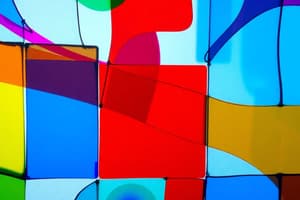Podcast
Questions and Answers
What is a significant disadvantage of glass in construction?
What is a significant disadvantage of glass in construction?
- High cost of manufacturing (correct)
- High energy efficiency
- Exceptional impact resistance
- Low maintenance cost
How does glass typically react when subjected to stress?
How does glass typically react when subjected to stress?
- It withstands stress very well
- It bends significantly before breaking
- It fails or breaks with little strain (correct)
- It absorbs energy and reshapes
Why is glass considered unsafe in earthquake-prone areas?
Why is glass considered unsafe in earthquake-prone areas?
- It is less brittle than alternative materials
- It is heavier, providing stability
- It tends to break or collapse quickly (correct)
- It can withstand high temperatures
What does corrosion of glass due to alkali solutions lead to?
What does corrosion of glass due to alkali solutions lead to?
What maintenance issue is commonly associated with glass in humid or dusty regions?
What maintenance issue is commonly associated with glass in humid or dusty regions?
What are the primary raw materials used in the production of glass building material?
What are the primary raw materials used in the production of glass building material?
Which property of glass allows it to serve effectively as a glazing material in construction?
Which property of glass allows it to serve effectively as a glazing material in construction?
What is the manufacturing process for glass primarily based on?
What is the manufacturing process for glass primarily based on?
Which type of glass is best suited for making glass canopies due to its ability to reduce harmful rays?
Which type of glass is best suited for making glass canopies due to its ability to reduce harmful rays?
What feature distinguishes shatterproof glass from other types of glass?
What feature distinguishes shatterproof glass from other types of glass?
What is a unique characteristic of float glass?
What is a unique characteristic of float glass?
What is the typical composition of laminated glass?
What is the typical composition of laminated glass?
Which type of glass is primarily used where visual distortion is not a concern?
Which type of glass is primarily used where visual distortion is not a concern?
How is energy-efficient glass manufactured?
How is energy-efficient glass manufactured?
What is the major advantage of using toughened glass in construction?
What is the major advantage of using toughened glass in construction?
What type of glass combines safety with an aesthetic appeal by offering transparency with reduced glare?
What type of glass combines safety with an aesthetic appeal by offering transparency with reduced glare?
Float glass is characterized by what manufacturing method?
Float glass is characterized by what manufacturing method?
Which type of glass is primarily molded into decorative features and structural elements?
Which type of glass is primarily molded into decorative features and structural elements?
What is a common application for shatterproof glass?
What is a common application for shatterproof glass?
Which property is specifically associated with laminated glass?
Which property is specifically associated with laminated glass?
The thickness of float glass is available in which of the following ranges?
The thickness of float glass is available in which of the following ranges?
What benefit does glass provide in terms of energy efficiency?
What benefit does glass provide in terms of energy efficiency?
Which property makes glass easy to maintain and clean?
Which property makes glass easy to maintain and clean?
Why is glass considered aesthetically appealing in construction?
Why is glass considered aesthetically appealing in construction?
What is a significant environmental benefit of glass?
What is a significant environmental benefit of glass?
What characteristic of glass makes it resistant to damage from ultraviolet radiation?
What characteristic of glass makes it resistant to damage from ultraviolet radiation?
Which statement accurately reflects the weather resistance of glass?
Which statement accurately reflects the weather resistance of glass?
How is glass described in terms of electrical insulation?
How is glass described in terms of electrical insulation?
What is one advantage of the color availability in glass?
What is one advantage of the color availability in glass?
Which type of glass has light-sensitive properties?
Which type of glass has light-sensitive properties?
What is the main engineering property of glass that allows visibility?
What is the main engineering property of glass that allows visibility?
What does the U value of glass indicate?
What does the U value of glass indicate?
Which property of glass allows it to be recycled and shaped?
Which property of glass allows it to be recycled and shaped?
What type of glass provides aesthetic advantages in architecture?
What type of glass provides aesthetic advantages in architecture?
Which of the following statements is true regarding glass strength?
Which of the following statements is true regarding glass strength?
What is one major advantage of using glass in construction?
What is one major advantage of using glass in construction?
What defines the transmittance property of glass?
What defines the transmittance property of glass?
Flashcards are hidden until you start studying
Study Notes
Glass Building Material
- Glass is made from a mixture of silica, sodium potassium carbonate, lime or lead oxide, and manganese oxide.
- Glass is a transparent or translucent, hard material that can be molded into any shape.
- Glass is often used in construction for its aesthetic and practical advantages, such as its transparency, ability to transmit light, and durability.
Types Of Glass Used In Construction
- Sheet or Flat Glass is made by passing molten glass through rollers to create a flat finish. It is commonly used in greenhouses and other applications where visual distortion is not a concern.
- Float Glass is made by floating molten glass on a bed of molten tin, creating a flat, clear, and distortion-free glass. It is commonly used for windows, shop fronts, and in public places.
- Laminated Glass is made of layers of ordinary glass bonded by a transparent, flexible material. It is typically used for bridges, stairs, aquariums, and canopies.
- Shatterproof Glass is made by adding a plastic polyvinyl butyral resin to prevent it from shattering into sharp pieces. It is commonly used in windows, floors, and skylights.
- Energy-efficient Glass is produced by glazing float glass with a special thin coating on one side, allowing solar energy to pass through in only one direction.
- Wired Glass contains a wire mesh embedded within the glass, providing fire resistance.
- Tinted Glass is colored to reduce glare and heat gain.
- Toughened Glass is strengthened by heat treatment, making it more impact resistant than regular glass.
- Chromatic Glass is a type of glass that can control the transparency of glass, protecting the interior from daylight, and can be photochromic (light sensitive), thermos-chromatic (heat sensitive), or electrochromic (electrically controlled).
- Glass Blocks are two halves of glass pressed and annealed together during the melting process, creating a solid glass structure.
- Glass Wool consists of glass fibers and is used as an insulating filler.
Properties of Glass
- Transparency: Allows light to pass through it, making objects behind the glass visible.
- Workability and Recycle Property: Can be molded into various shapes and is 100% recyclable.
- Strength: Although generally brittle, its strength can be enhanced by adding admixtures and laminates.
- Transmittance: Refers to the amount of visible light that passes through the glass.
- U Value: Represents the amount of heat transferred through the glass, with insulated glass units having a low U value.
Advantages of Glass
- Transparency: Allows natural light to enter buildings, reducing energy consumption and providing visual connection to the outside world.
- Dust-proof and Waterproof: Its smooth surface makes it easy to clean and resistant to water damage.
- Color Availability: Available in a wide range of colors, and can be combined in laminated or insulated units to create unique visual effects.
- Aesthetically Appealing: Adds beauty and sophistication to buildings.
- Recyclable: Can be recycled repeatedly without compromising quality or purity, saving energy and resources.
- UV Stable: Resists damage from ultraviolet radiation.
- Weather and Rust resistant: Resists corrosion and weathering, retaining its appearance and integrity over time.
- Easily Molded: Can be easily molded into various shapes, allowing for versatile designs.
- Insulator of Electricity: Does not readily conduct electricity, providing protection from electrical hazards.
Disadvantages of Glass
- Cost Is High: The energy-intensive manufacturing process makes it an expensive material.
- Brittleness: Can break easily under stress, producing sharp shards that can cause injury.
- Impact Resistant Is Low: Can break under impact loads.
- Corrosion Due To Alkali Solution: Can be affected by alkali solutions, leading to surface corrosion.
- Unsafe for Earthquake-prone Areas: Its brittleness makes it unsuitable for buildings in earthquake-prone areas.
- Maintenance Cost Is High: Requires regular cleaning to maintain its appearance and clarity.
Studying That Suits You
Use AI to generate personalized quizzes and flashcards to suit your learning preferences.




